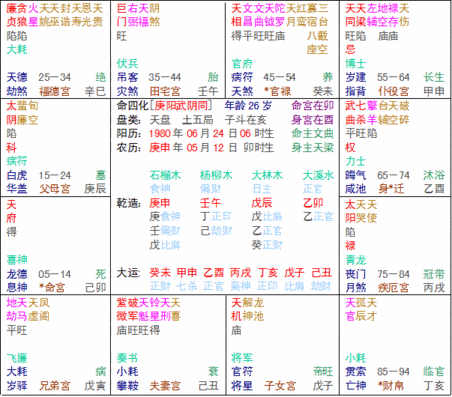紫微 「Zi Wēi 」 - literally translated as Purple Star - is the 'Emperor Star' of the chart.
It is known as the North Star in the West.斗数 「Dou Shù 」 means calculation.
《紫微斗数》 thus means the study of a person's life based on the movement and location
of the 紫微 Star and 100+ other stars at the specific time the person was born.
Based on one's Year, Month, Date and Time of birth - also known as 八字 「Bā Zì 」,
calculations are worked out to chart the stars into 12 different palaces or 宫 「Gōng 」.
This would then be one's Birth Chart or 命盘 「Mìng Pán 」.
By integrating the stars and palaces, their attributes, environmental factors, elemental
forces, Yin and Yang concept and all the possible combinations and variations, not only can
personalities be understood, but personal and professional relationships can be predicted,
and what to expect of any given year and duration of specific events can be forecasted as well.
An example of a Birth Chart looks like this -

The plotting of one's birth chart is not difficult. What is difficult in 《紫微斗数 》 is
the complex system of interpretation that allows us to 'see' the blueprint of our lives. If
interpreted correctly, our birth charts can describe our past, present and future accurately.

History of 《 紫微斗数 》
《紫微斗数》 was devised by a Taoist named 呂純陽 and later on
developed by 陳希夷 during the Song Dynasty (960-1279 AD) and later
on 羅洪先 during the Ming Dynasty (1368-1644 AD) to what it is today.
However, its origin is still debated among the different schools.
Chinese Astrology was closely intertwined with Astronomy and gifted Astronomer-Astrologers
were recruited as officials to work in the Imperial Court. In those days, astrological charts
were delineated for the Emperor as his personal fate has a direct bearing on that of his Kingdom.
The court astrologers played an important role in determining the successor to the throne too.
Astrologers observed the stars and noticed that among so many stars, only one
was seemingly stationary while the rest revolved around it. As it was also the brightest,
the star was named the 'Emperor Star' - the celestial equivalent of the Emperor.

As with all other forms of fortune-telling, the Chinese do not generally see astrology
as an infallible guide to what will happen, but more as a form of weather
forecasting - knowledge about the factors that might influence events so as to be
more able to gauge the situation and make decisions from a position of strength.
《ZWDS》 approaches the world and events from the idea that, to view
things in their proper context, it is important to recognise the dynamism
of the universe, and that the pattern of change is the fundamental truth.


